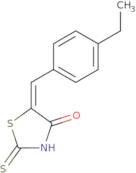(5E)-5-(4-Ethylbenzylidene)-2-mercapto-1,3-thiazol-4(5H)-one
CAS: 403811-55-2
Rif. 3D-FE119181
| 1g | Fuori produzione | ||
| 2g | Fuori produzione | ||
| 5g | Fuori produzione | ||
| 10g | Fuori produzione | ||
| 500mg | Fuori produzione |
Informazioni sul prodotto
- (5E)-5-(4-Ethylbenzylidene)-2-thioxo-1,3-thiazolidin-4-one
- (5Z)-5-(4-ethylbenzylidene)-2-thioxo-1,3-thiazolidin-4-one
- 10058F4
- 4(5H)-thiazolone, 5-[(4-ethylphenyl)methylene]-2-mercapto-, (5E)-
- 4(5H)-thiazolone, 5-[(4-ethylphenyl)methylene]-2-mercapto-, (5Z)-
- 4-Thiazolidinone, 5-[(4-ethylphenyl)methylene]-2-thioxo-
- 4-thiazolidinone, 5-[(4-ethylphenyl)methylene]-2-thioxo-, (5E)-
- 5-[(4-Ethylphenyl)methylene]-2-thioxo-4-thiazolidinone
5-Ethyl-2-mercapto-1,3-thiazol-4(5H)-one is a small molecule that inhibits cellular transformation and induces apoptosis in cancer cells. It has been shown to inhibit the proliferation of HL60 cells and to induce apoptosis in resistant breast cancer cells. 5-Ethyl-2-mercapto-1,3-thiazol-4(5H)-one inhibits the activity of cyclin D2, which is a protein that controls cell cycle progression from G1 phase to S phase. In addition, 5E -2MTSZ induces apoptosis by inhibiting caspases, proteins that are necessary for the breakdown of cellular components. This compound also inhibits the expression of Myc oncogene and decreases mitochondrial membrane potential by inhibition of pyruvate dehydrogenase kinase (PDK) 1. These effects lead to activation of caspases and induction of apoptosis in cancerous tissues.





